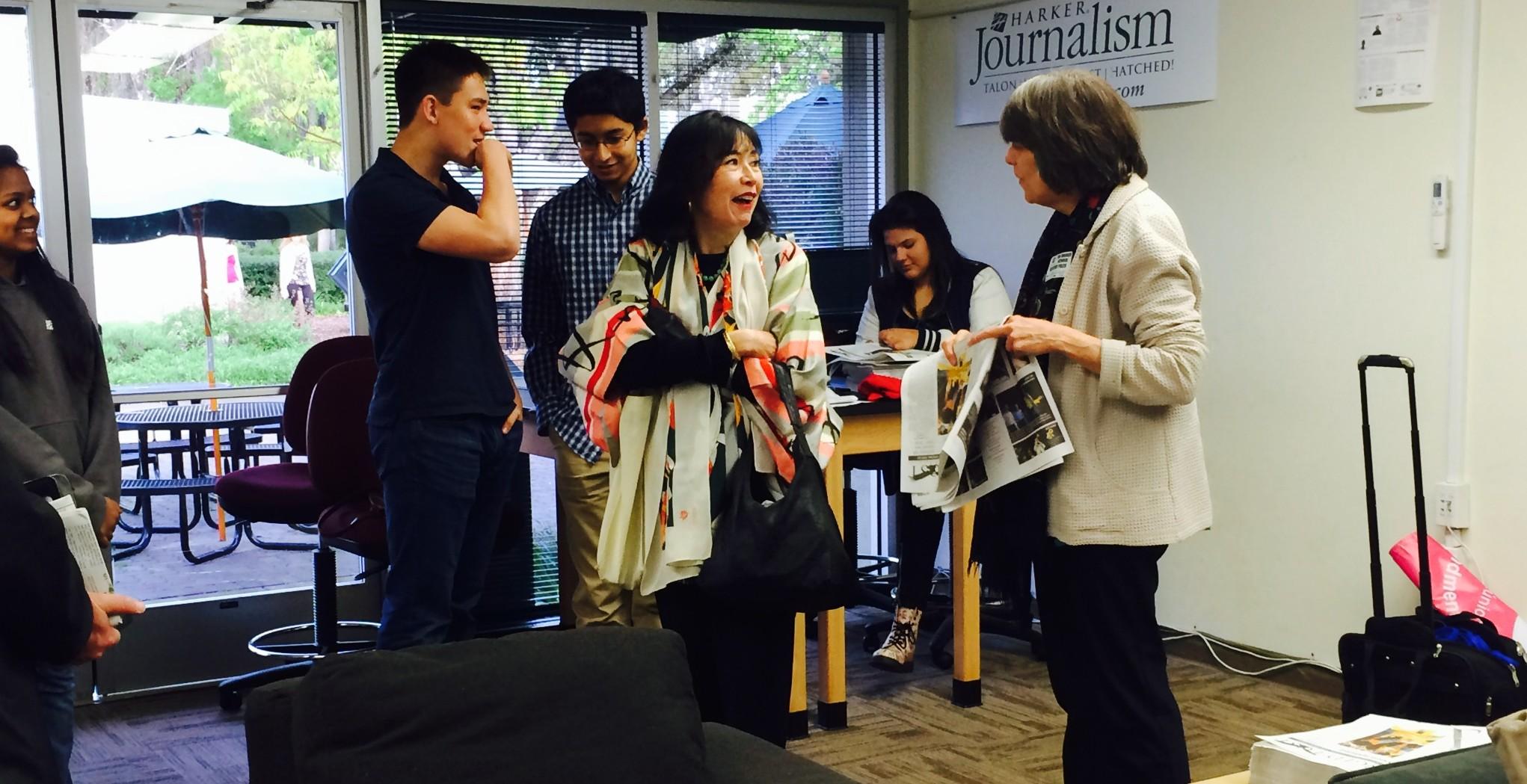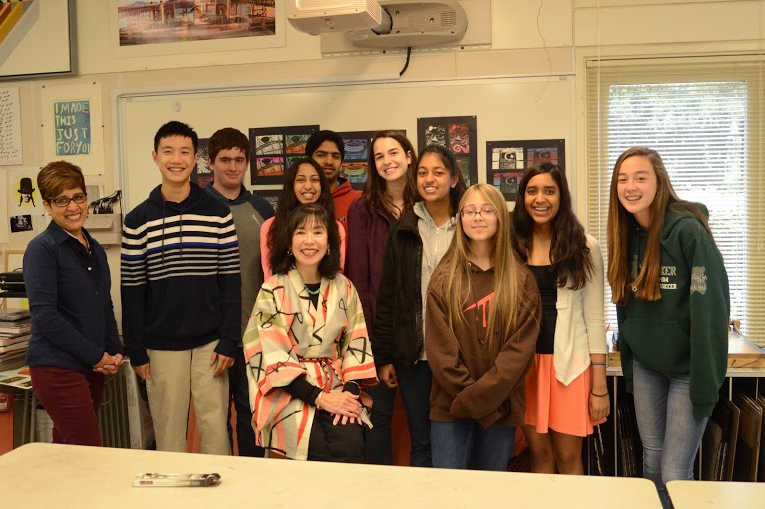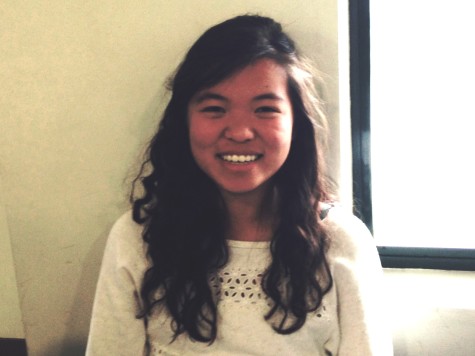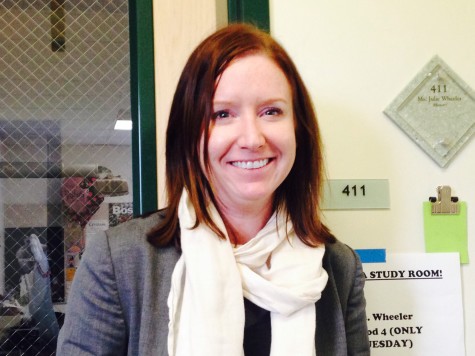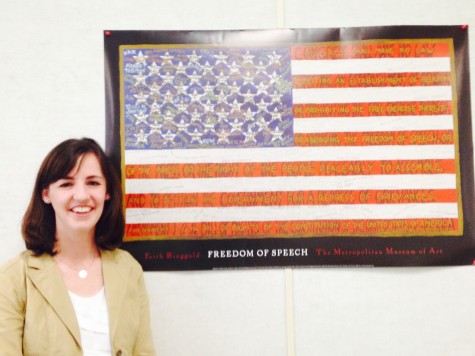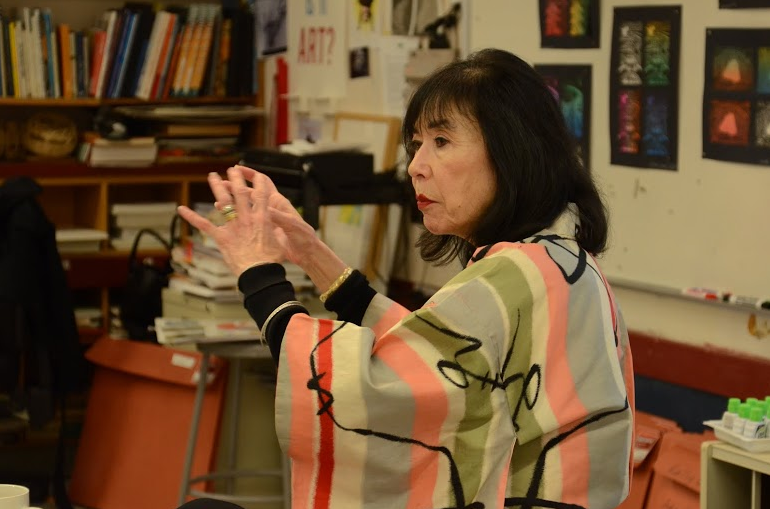Tinker Tour and Karen Korematsu visit the Upper School
April 5, 2014
Faces brightened and smiles widened as the second period journalism students welcomed Mary Beth Tinker, Frank Lamonte, and Karen Korematsu to the Upper School.
The Tinker Tour made a stop at the school yesterday, joining Karen Korematsu in an assembly about civil liberties and students’ rights.
The bus tour includes Mary Beth Tinker and executive director of the Student Press Law Center (SPLC) Frank Lomonte, who have scheduled both West and East Coast legs of the tour.
The West Coast stretch of the Tinker Tour began in Illinois on Feb. 26 and made its way through Indiana, Oregon, Utah, and California.
The tour will continue into Arizona, New Mexico, Texas, Oklahoma, Kansas, Nebraska, Minnesota, Idaho, and Washington, and finish out in Canada on May 2 with a kickoff event for the Tinker World Tour.
The complete itinerary for the Spring tour with locations and dates of visit is displayed on the Tinker Tour site.
The Upper School also hosted Karen Korematsu, executive director and co-founder of the Korematsu institute, which honors her father, Fred T. Korematsu of the landmark court case Korematsu v United States.
Korematsu visited art, Japanese, and journalism classes, speaking to students about the Korematsu case and the importance of having a voice. The three speakers shared their thoughts with the entire school at the Friday morning assembly.
The Tinker Tour’s next destination is a meeting with juvenile judge Tom Jacobs in Flagstaff, Arizona.
Japanese Internment: Poll Results
To see how familiar Upper School students were with the Korematsu case and Japanese Internment, Aquila polled students and faculty with three true or false questions. A total of 135 responses were collected.
Following the Tinker Tour
Aquila mapped the more recent six destinations of the Tinker Tour, which made its stop at Harker yesterday, April 4.
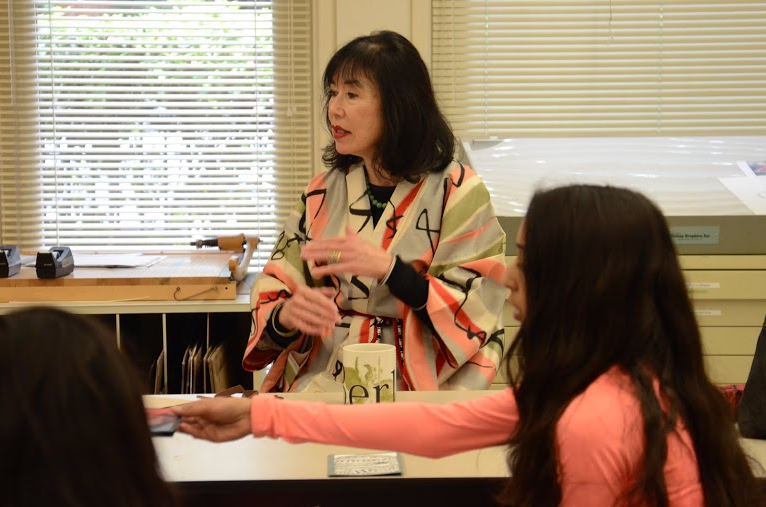
Karen Korematsu visits Japanese and Study of Visual Arts classes
Karen Korematsu, daughter of Fred Toyosaburō Korematsu of the landmark Korematsu v. United States case, visited Upper School students today and talked to Japanese 1 and Study of Visual Arts classes.
The Korematsu v. United States case took place when Fred Korematsu resisted the Japanese American draft into internment camps by Executive Order 9066. While Korematsu initially lost the case 6-3 at the Supreme Court level, the ruling was eventually overturned after evidence surfaced disproving the militaristic need for the internment. He was awarded the Presidential Medal of Freedom by Bill Clinton in 1998 for his actions.
Following the assembly in which she presented her father’s story along with Mary Beth Tinker and Frank LoMonte, Korematsu went to Pilar Aguero-Esparza’s Study of Visual Arts’ class and answered students’ questions as part of her visit to these classes.
“I realized […] that I’m lucky for what I have as an Asian American dealing with no discrimination because of my skin,” Vienna Wang (9) said. “Her father was really courageous to stand up and speak for himself and so many others.”
Fred Korematsu day can now be celebrated on Jan. 30 in California.
History students use scholastic knowledge to reflect on speakers
Immersed in the worlds of constitutional rights and landmark supreme court decisions that have shaped the path of American democracy, Juniors taking US History courses this year saw the pages of their textbooks come to life in today’s assembly, which featured two of the most prominent cases of the twentieth century–Tinker and Korematsu.
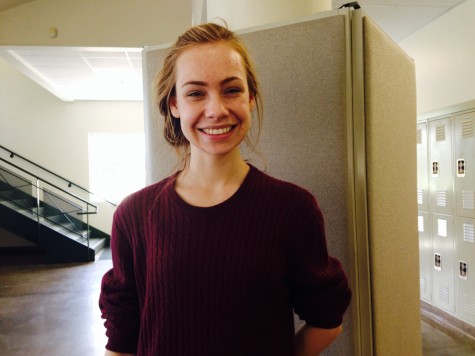
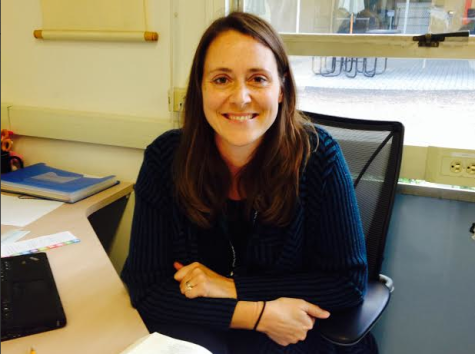
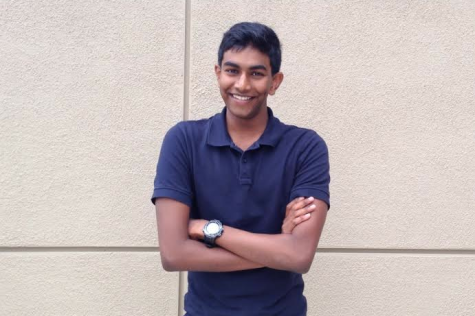
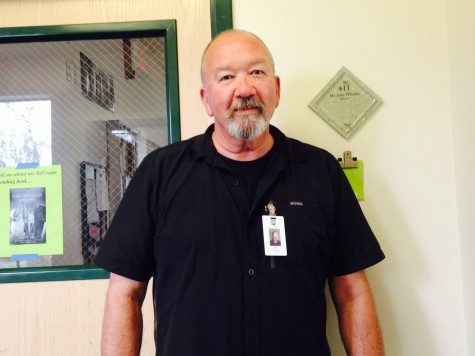
Q&A with Karen Korematsu
Aquila: What has been the most rewarding part of speaking to students about civil liberties?
Karen Korematsu: You’re our future for this country, and I love the way that you all see the significance of the lessons of history but also what it means for your future and the future of this country. I’m always inspired by all of your different reactions, of being able to connect with all of you, and having this opportunity to have some one-on-one dialogue as well. I love the questions that students ask me. It also helps me to know what you’re interested in and the information that you need that will help you to make a difference.
AQ: What made you decide to dedicate your life to speaking on behalf of this cause?
KK: My father gave me that charge towards the end of his life, so it was certainly not something I ever thought I would be doing. If you told me that this what I’d be doing the rest of my life, I would have said you’re crazy. Ten years ago, I would have not thought that. But the more I listened to my father when he spoke to schools like yours and students and other organizations and universities and saw how inspired that the students were – I didn’t know if I had that kind of ability and so I really doubted myself in the beginning, but the experiences like talking to all of you today just continues to make me inspired and to get up in the morning and say yes this is important.
My father gave me that charge before the end of his life that I had to continue educating people about the past so that we don’t make the same mistakes in the future because that was truly what he was afraid of. Especially because his Supreme Court record is still considered good law, even though it’s been discredited, it still can be used in times of national stress in this country as a reason to round up a group of people just because they look like the enemy and that’s not right. Even though we think we have people in government that should know better, people have short memories and they didn’t learn the lessons when they were young people like you all the opportunity to now, to listen to me, to listen to Mary Beth Tinker and other speakers that come to this school that help to kind of shape your future. I think that’s what we’re hoping for because we’re not going to live forever. These stories are going to get lost from generation to generation if we don’t try to make that effort.
My response has been even a worldwide interest about my father’s story. So America is like one nut to crack, and I’ve got all these others for the world because we have teaching kits and have developed teaching curriculum that we send out to teachers for free. Any teacher from all over the world can order these kits online from the institute and they’ve gone to even Japan, Singapore, and Sri Lanka, and to Canada, and to England, and so we can see that my father’s story is not just an American story, it’s not just a West Coast story, it’s a national story and an international human rights story. That’s how we learn – by teaching those lessons.
AQ: You mentioned earlier that you have a background in fine arts. Was it difficult for you to give up your other career paths to pursue this mission?
KK: It wasn’t really difficult. I was kind of gradually spending more time with my father and taking care of him and my parents, so I had declined some of work. It wasn’t like I was working one day and stopped the next, but I just had slowly transitioned into this position even though I didn’t know that’s what I was doing.
AQ: Can you talk a little bit about the stories that you heard from your dad about being in a camp?
KK: It was basically barren land and no trees, very hot in the summertime and cold in the wintertime, but the community tried to be resourceful. As I kind of touched upon, the teachers had to create their own classrooms. As students, you had to still keep learning. They eventually had some dance bands, like on the weekend. They did play baseball, they were able to send in some of that type of equipment. They had Boy Scouts troops, Girls Scouts troops, they would attend whatever kind of religious service they had, whether it was Buddhist or Christian. There was no privacy, so it was really kind of humiliating especially for people like my grandparents. You had to kind of keep your life going because what are you going to do, you’re going to be totally bored otherwise. You don’t have television, there’s no iPods, you have to create your own music. There’s no radios. You’re basically shut off from the rest of the world. You don’t even know what’s going on. You do receive mail. All the mail though was all opened, all scrutinized before you received it, but you get information kind of from the outside world so to speak.
In my father’s case, as we kind of touched on when we were doing the Q&A, he was totally vilified. He was considered a pariah. No one wanted anything to do with him, so he kind of lived out on the outer edge of the camp by himself. Basically in a lot of family culture, he brought shame to the family. My grandmother was totally upset and felt the shame of it all, and my grandfather was just disgusted with my father because he had done this, and he never had the support of his brothers. Even when he wanted to reopen the case, his youngest brother was still living at the time and he said, ‘Fred, why do you want to open that up and stir up all this trouble again?’ And my father said, ‘Because I think this is right.’
They had this evidence, they had proof and documents because at the time of my father’s Supreme Court case, you know the Department of Justice have a lot of say-so as far as the cases that are brought before the Supreme Court. The Department of Justice at the time of my father’s court case in 1944 lied to the Supreme Court, altered evidence, and destroyed evidence. That’s pretty bad. You’re not talking about impacting one person, you’re talking about impacting an entire community because as Mary Beth Tinker was saying, the German-Americans, the Italian-Americans, they rounded up some people and they put them in some of the Department of Justice camps, but not en masse. Like I said, you only have to be 1/16th of that heritage. And my father, here he is, he’s accused of being a spy, a Jap spy, and he’s never even been to Japan. He just happens to be Japanese. He’s an American. That’s the way he was thinking. He’s an American. That’s what he was questioning – what does it mean to be an American in this country? It was interesting interviewing people that have survived or are still living after the time of the internment because the community itself like my father really didn’t want to talk about what had happened. They just wanted to get on with their lives and prove they were good Americans.
And then we would encourage young people like you – go home and whatever your culture is, go home and ask your parents where did your grandparents come from, or how did they get here? Unless you’re a Native American Indian , you came from someplace else – your grandparents, your great grandparents came from someplace else. And once you understand the hardships that they went through and you understand your own story, then you have a greater appreciation I hope of understanding other people’s story and their struggles. We’ve come a long ways, and it’s thanks to a lot of other communities now. I work with the Arab and Muslim-American community because after 9/11, the parallels between what happened to the Japanese-American internment and what happened to anybody who was Arab or Muslim American, the parallels were pretty strong. So it was my father and the Japanese American Citizens League that said you cannot even talk about trying to round up Arab and Muslim-Americans and put them in camps even if you think it’s for their own good. If we don’t set the example to do the right thing, then we can’t expect the rest of the world to be accountable for human rights.
You probably have heard now that you’re getting older and you’re studying about these things some of the atrocities that have happened for people regarding human rights and we still have situations in China where people are still in jail. It was like those girls in Russia who were speaking up and then they got arrested. These kinds of incidents still happen. We, living in this country, have to speak up and say no you can’t do that. So when you get older and you have to make those hard decisions, I hope you will remember the lessons of Mary Beth speaking up and taking a risk because that must have really hard to say this was not right. If we don’t start trying to appreciate our differences then we’re not going to get very far.
